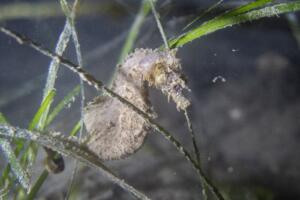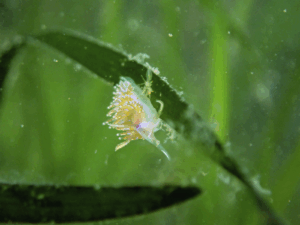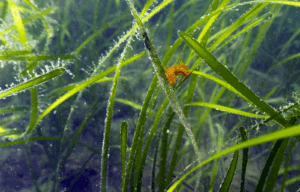Fundraising: Protecting Devon’s Hidden Seagrass Meadows
Tucked away in the calm waters of Fishcombe Cove, just beyond the bustle of Brixham’s harbourside, lies a lesser-known but vital part of Devon’s coastal ecosystem – seagrass.
These submerged flowering plants form dense, underwater meadows that are home to a remarkable array of marine life. Found in just a few remaining sites in the UK, including right here in South Devon, seagrass beds are quietly performing an essential role for the health of our seas.
Now, a grassroots conservation project in Brixham is working to safeguard these rare habitats – and you can help make a difference.
What is Seagrass and Why Does it Matter?
Often mistaken for seaweed, seagrass is a completely different species – more closely related to the grasses that grow on land. But beneath the surface, its role in our marine environment is both powerful and complex.
Carbon Storage: Seagrass can absorb and store carbon up to 35 times faster than tropical rainforests, helping to combat climate change.
Biodiversity: These meadows act as nurseries for young fish, including species vital to local fisheries. They also provide shelter for invertebrates, birds. and protected species such as the short-snouted seahorse.
Coastal Protection: Seagrass stabilises sediments, reduces erosion, and helps maintain water clarity and quality.
Despite these benefits, the UK has lost more than 90% of its seagrass beds in the last century due to pollution, anchoring, and coastal development. In Devon, the few sites that remain – including Fishcombe Cove, Shoalstone, and Breakwater Beach – are increasingly valued for both their ecological and educational potential.
A Local Effort with a Long-Term Vision
The Cove Discovery Project, founded by Brixham-based conservationists Chris Thomas and Duncan Kenny, is working to change this trajectory. Their goal is to monitor and protect these seagrass habitats while strengthening community connections to the marine environment.
By carrying out regular dive surveys, the team is building scientific understanding of local seagrass beds — data that will be used to propose Fishcombe Cove as a Voluntary No Take Zone, offering protection to both plants and the species that rely on them.
The project also runs education sessions, citizen science activities and public events to help people of all ages discover the rich biodiversity beneath the surface of their local beaches.
“We believe people protect what they understand,” says co-founder Chris Thomas. “Once you’ve seen a seahorse in the seagrass or a cuttlefish hovering above the sand, it’s hard not to care.”
How You Can Help
To expand this work over the next five years, The Cove Discovery Project is raising funds through a Crowdfunder campaign aiming to raise £20,000, to fund regular monitoring dives, data analysis, community events and educational outreach for the first year.
All donations are currently being matchfunded – doubling the impact for local seagrass conservation. These match funds are made possible by Regatta Foundation and Conservation Collective’s partnership with Regatta Great Outdoors.
That means your contribution will go twice as far!
You can read more about the campaign or donate here:
🔗 Seagrass Protection in Brixham – Crowdfunder
A Devon Coastline Worth Caring For
Devon is known for its rolling hills, dramatic moors, and postcard-worthy coastlines. But just beneath the waves, there are equally precious landscapes — quiet, thriving habitats that deserve as much attention and care as the views above.
Whether you’re visiting the English Riviera on holiday or exploring your own local shoreline, projects like The Cove Discovery Project offer a chance to better understand what makes this part of Devon so ecologically rich — and how we can help it stay that way.
Add your support to our Crowdfunder and double your donation HERE.



Images courtesy of The Cove Discovery Project.
